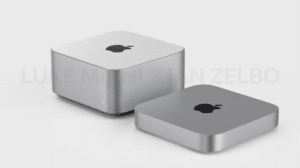As per new benchmark numbers, the A14X Bionic chip in the upcoming Apple Silicon Mac leaves the Intel Core i9 in the dust. These new benchmark numbers have appeared on Geekbench, before the actual product will be announced in just a few days during Apple’s ‘One more thing‘ event on November 10.
A14X Bionic chip beats Intel’s Core i9
As per new Geekbench benchmarks spotted by AppleInsider, the A14X Bionic chip from the upcoming Apple Silicon Mac scored the following numbers:
- Single-core: 1634
- Multi-core: 7220
Compared to the A14 used in iPad Air 4, and iPhone 12, it is much faster. Here are the benchmarks from the A14 chip:
- Single-core: 1583
- Mult-core: 4198
The massive increase in multi-core numbers for A14X when compared to the A14 can be attributed to the increase in the number of cores and clock speed. As per the benchmarks, A14X Bionic architecture shows an 8-core processor with a big-little arrangement. The processor is clocked at 1.80GHz but turbo-boosts to 3.10GHz. This will be the first A-series processor to break the 3GHz barrier. The benchmarks also show 8GB of RAM, although we are certain that Apple would allow for higher RAM configurations in its ARM-based Macs.
![]()
How fast is A14X compared to the Intel Core i9?
You are in for a surprise. We already knew that Apple’s A-series processors are already faster than most Intel processors out there, but the A14X Bionic beats the top-of-the-line Intel Core-i9 processor. The 9th generation Intel Core i9 processor in Apple’s 16-inch MacBook Pro scores the following in Geekbench:
- Single-core: 1096
- Multi-core: 6869
In both tests, the A14X simply leaves the Intel processor behind.
How fast is A14X compared to Surface Pro chip?
The Microsoft SQ2 chip in Surface Pro X also features 8 cores and is clocked at 3.15GHz. This is how it fares in Geekbench:
- Single-core: 791
- Multi-core: 2815
As you can tell, the SQ2 chip offers virtually no competition to the upcoming A14X Bionic, let alone Apple’s older A-series chips.
Note that we are unsure whether these numbers are from the high-end A14X Bionic chip, or if Apple will use the same chip in all upcoming Apple Silicon Macs, and only differentiate them with the amount of storage and RAM in them. We also cannot verify for ourselves if these numbers are genuine, however, when we compare them to A14’s numbers, we have reason to believe they are likely real.
There are still many unknowns when it comes to the new ARM-based processors, but one thing is for certain – Intel should be very worried that it is about to face even more competition from Apple, along with the on-going challenge from AMD.
Read more:



3 comments